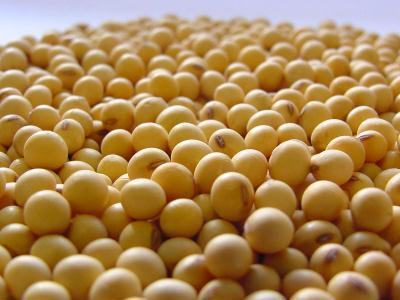Soja contém compostos que podem estimular o desenvolvimento de alimentos funcionais, por Henrique Cortez

[EcoDebate] A soja contém altos níveis de diversos compostos benéficos à saúde, incluindo tocoferóis, que têm propriedades antioxidantes. Estas moléculas podem ser usadas no desenvolvimento de alimentos funcionais, que têm propriedades benéficas à saúde específicas e podem ser usados no tratamento ou prevenção de doenças.
Tocoferóis existem em quatro formas (α, β, γ, and δ), sendo que γ-Tocoferol é encontrada em maior concentração na soja, com a maior atividade antioxidante.
Outros estudos há haviam sugerido que todos os tocoferóis podem desempenhar um papel significativo na prevenção de doenças cardiovasculares e câncer.
Pesquisadores da Universidade McGill, do Centre de Recherche sur les Grains, e Agriculture and Agri-Food Canadá, em Quebec estudaram a concentração de tocoferóis e sua estabilidade, com ênfase em γ-Tocoferol, entre os genótipos de maturação precoce cultivadas em vários ambientes, visando determinar a relação entre a concentração de tocoferóis e outras características da semente.
Os resultados do estudo serão publicados na edição de setembro-outubro de revista Agronomy Journal. A pesquisa também foi apresentada em Pequim, na 8a. World Soybean Research Conference, em agosto de 2009.
A pesquisa será continuada para identificar fatores que afetam a concentração de tocoferóis na soja. Os resultados preliminares sugerem que os fatores ambientais específicos e as práticas de gestão, tais como data de semeadura, podem afetar significativamente as concentrações.
Obter uma melhor compreensão dos fatores, que afetam a concentração de tocoferóis na soja, pode ajudar no desenvolvimento de um novo valor agregado para a utilização de soja e, assim, a diversificar os mercados para os produtores de soja.
Tocopherols Concentration and Stability in Early Maturing Soybean Genotypes
Seguin et al. Agron J.2009; 101: 1153-1159
Philippe Seguina,*, Pierre Turcotteb, Gilles Tremblayb, Denis Pageauc and Wucheng Liua
a Dep. of Plant Science, McGill Univ., Macdonald Campus, Sainte-Anne-de-Bellevue, QC, Canada
b CEROM, Centre de Recherche sur les Grains, Inc., Saint-Mathieu-de-Beloeil, QC, Canada
c Agriculture et Agroalimentaire Canada, Centre de Recherche et de Développement sur les Sols et les Grandes Cultures, Normandin, QC, Canada
* Corresponding author (philippe.seguin{at}mcgill.ca).
Soybean [Glycine max (L.) Merr.] is an important source of tocopherols which have health-beneficial properties. A study was conducted to determine tocopherols concentration and stability in early maturing soybean genotypes and to determine their relationships to other important seed characteristics. Twenty soybean genotypes were grown in replicated trials in six environments of eastern Canada, and their total-,  -,
-,  -, and
-, and  -tocopherol concentrations were determined by high-performance liquid chromatography. Seed yield, 100-seed weight, and crude protein and oil concentrations were concurrently determined. Genotype and environment main effects and G x E interactions were observed for all tocopherols. Variations in the ranking of genotypes were, however, limited. Across environments and genotypes, relative proportions of
-tocopherol concentrations were determined by high-performance liquid chromatography. Seed yield, 100-seed weight, and crude protein and oil concentrations were concurrently determined. Genotype and environment main effects and G x E interactions were observed for all tocopherols. Variations in the ranking of genotypes were, however, limited. Across environments and genotypes, relative proportions of  -,
-,  -, and
-, and  -tocopherol were 6, 34, and 60%, respectively. Variation in
-tocopherol were 6, 34, and 60%, respectively. Variation in  -tocopherol among genotypes was significant, with concentrations ranging between 8.7 and 33.2 µg g–1 across environments. Differences between environments were significant, albeit minimal, for all tocopherols; there was a 42% average variation in
-tocopherol among genotypes was significant, with concentrations ranging between 8.7 and 33.2 µg g–1 across environments. Differences between environments were significant, albeit minimal, for all tocopherols; there was a 42% average variation in  -tocopherol concentration across environments. Stability of genotypes for
-tocopherol concentration across environments. Stability of genotypes for  -tocopherol was not linked to mean concentration; however, some genotypes with high stability and mean concentration were identified, including the cultivar Heron. No correlations were observed between
-tocopherol was not linked to mean concentration; however, some genotypes with high stability and mean concentration were identified, including the cultivar Heron. No correlations were observed between  -tocopherol and any of the other seed characteristics investigated. However, negative correlations were observed between the other tocopherols and seed yield, 100-seed weight, and crude protein. Tocopherols were positively correlated with each other, except for a negative correlation between
-tocopherol and any of the other seed characteristics investigated. However, negative correlations were observed between the other tocopherols and seed yield, 100-seed weight, and crude protein. Tocopherols were positively correlated with each other, except for a negative correlation between  – and
– and  -tocopherol. The large variation observed among genotypes for
-tocopherol. The large variation observed among genotypes for  -tocopherol, the relatively high stability of genotypes performance across environments, and the lack of negative correlation with other important seed characteristics suggest that selection for high
-tocopherol, the relatively high stability of genotypes performance across environments, and the lack of negative correlation with other important seed characteristics suggest that selection for high  -tocopherol could be possible.
-tocopherol could be possible.
All rights reserved. No part of this periodical may be reproduced or transmitted in any form or by any means, electronic or mechanical, including photocopying, recording, or any information storage and retrieval system, without permission in writing from the publisher.
Received for publication April 7, 2009.
Por Henrique Cortez, do Ecodebate, com informações de Sara Uttech, American Society of Agronomy
Por Henrique Cortez, do EcoDebate, 30/09/2009
Inclusão na lista de distribuição do Boletim Diário do Portal EcoDebate
Caso queira ser incluído(a) na lista de distribuição de nosso boletim diário, basta utilizar o formulário abaixo. O seu e-mail será incluído e você receberá uma mensagem solicitando que confirme a inscrição.
 |
| Participe do grupo Boletim diário EcoDebate |
| Visitar este grupo |
Fechado para comentários.